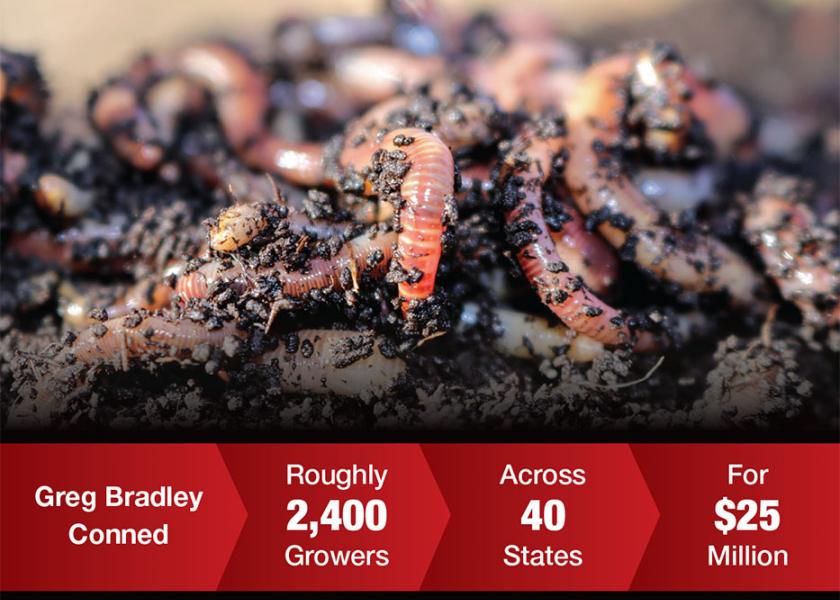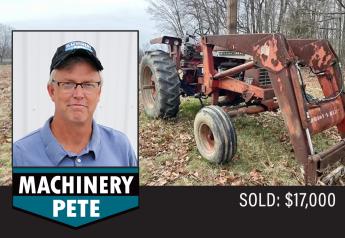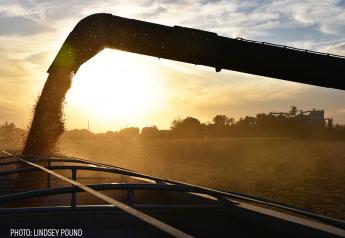Ag's Darkest Fraud Hidden in Dirt

Put a shoulder to the door of agriculture’s basement closet and loose a jumble of skeletons: Grain swindles, cattle rustling and snake oil schemes spill forth. Sift through the multibillion dollar bone pile and find what lies trapped beneath: a forgotten tangle of broken farmers who paid the costs of other’s ill-gotten gains.
In 2000, southwest Mississippi producer Rodney Burkley heard about a business venture gaining steam in multiple states. Nine months later in July 2001, Burkley rented a vehicle and hit I-20, bound for a fateful meeting in Oklahoma City. After a 550-mile drive, he walked into a tiny restaurant to hand over a big check. Two hours and one meal later, Burkley signed a $100,000 buy-in contract and shook hands with a goateed, unassuming man seated across the table. Appearances are worthless: Greg Bradley pocketed Burkley’s money and went on to bilk approximately 2,400 growers in 40 states for a stunning $25 million in rapid-fire fashion.
Bradley was in the process of crafting one of the most surreal tales in the history of agriculture crime, and his vehicle of choice was a multimillion dollar crop of earthworms.
Essentially, Bradley built a grand pyramid of worm grower contracts. Vermiculture, the breeding of worms for resale, and vermicomposting, the use of castings (worm waste material) as a high quality soil amendment, were a cloak to hide Bradley’s scam. Bradley started B&B Worm Farm in Meeker, Okla., in 1998, and offered growers red worm contracts ranging from $10,000 to more than $100,000. A grower might pay $15,000 for 100,000 breeding worms or $60,000 for 1.5 million worms, all supplied by B&B with a manual, worm harvesting equipment, toll-free help number and a one-year money-back guarantee. B&B then promised to buy all the worms a grower could breed for a contract price between $7 and $10 per pound. The math was simple: As long as grower contracts outpaced worm purchases, B&B would rake in phenomenal profits.
“He made inflated promises and people bought in hook, line and sinker. They were forking over the cash,” says Peter Bogdanov, a renowned authority on vermiculture and the owner of Vermico, a vermiculture business centered on science and research.
B&B needed a heavyweight from the vermiculture industry to provide the company with a stamp of legitimacy. Bradley found the perfect mark in Kelly Slocum.
Passionate about vermiculture and the genuine benefits it held for agriculture, Slocum was a self-educated master of worms, castings and waste management from Washington. A natural-born speaker with a sharp intellect, Slocum was the vermiculture apostle Bradley needed. In January 2001, Bradley flew to Washington and reeled in Slocum with a stack of documentation on worm product buyers, end users and grower contracts.
Publicly, Bradley used Slocum’s expertise to help growers produce worms. Privately, he used her name as a key of respect to open doors and make tremendous amounts of money. Slocum had no idea she’d signed a devil’s bargain: When the clock struck midnight, the mild-mannered Bradley would ruin her name and destroy her hard-earned reputation.
By 2001, Bradley had distribution centers in at least 12 states and grower contract sales surging. Ohio grain producer Floyd Weyrick was introduced to Bradley at a B&B presentation in Darke County.
“I met him face to face and I told him I didn’t believe what he was saying about worms. He boldly said, ‘If you don’t believe it then I don’t want you as a customer,’” Weyrick says.
Weyrick bought 300 lb. of worms to start, and turned several old hog barns into worm production buildings. “Bradley bought my worms for $8 a pound,” Weyrick recalls. “I sold him $39,000 in worms and everything looked bright—and then the bottom fell out.”
Where were the worms going that Bradley purchased from growers such as Weyrick? Bradley set up a fictitious roster of end-user companies that were purportedly buying B&B worm products. As the worms came in the B&B door, he sent them back out to fill new grower contracts.
As growers began churning out increasing numbers of worms and castings, payments for worm deliveries began hitting snags. With the incessant expansion of grower contracts, and a business model devoid of end users, Slocum began hammering Bradley demanding accountability.
With grower complaints over non-payment catching the ears of authorities, Bradley heard legal footsteps in Oklahoma. The Oklahoma Department of Securities (ODS) placed a cease-and-desist order on all B&B grower contracts on Aug. 13, 2002. Irving Faught, administrator of the ODS, says his investigators found $23 million in outstanding B&B debts.
With more than 800 contracted growers, Kentucky was hit particularly hard by B&B. “I remember our investigators going out and watching a shipment of worms leaving,” recalls Wanda Delaplane, former assistant attorney general of Kentucky. “The investigators were in shock and couldn’t believe a market existed for such a huge quantity of worms. How could it be? Turns out, Bradley was his own market.”
As with all Ponzi schemes, the end came with a bottom-of-the-barrel realization. When Weyrick delivered 400 lb. of worms to the B&B distribution agency in St. Mary’s, the load was refused. As Weyrick drove away, he faced the single biggest swindle he’d witnessed in a farming career spanning back to 1958.
Mirroring Weyrick, Burkley suddenly found payments were finished when he delivered his final worm load to the B&B distributor in Vicksburg. “It was like combining a crop and carrying it to elevator, but nobody pays you,” he says.
With B&B payments at an end and authorities closing fast in multiple states, the unusual theater surrounding the entire worm fraud hit an uncanny crescendo in January 2003, when Bradley was hospitalized in Shawnee. A few days later on Jan. 26, at age 40, the engineer of one of the oddest scandals ever was dead.
With an ill-timed death as authorities closed in and millions of dollars in question, many growers harbor doubts that still linger. “How could we not think it odd? I first heard he died from a brown recluse spider bite, and then I heard it was pneumonia. It was impossible to dissect the facts and frankly, I don’t believe we know what really happened,” Slocum says.
“I don’t care about death certificates or what anybody thinks,” Weyrick adds. “I said all along Bradley ain’t dead. Cremation? I think he went to Mexico with millions of dollars belonging to farmers.”
B&B slid into Chapter 7 bankruptcy, and the investigations went cold. Kentucky growers lost nearly $5.75 million to B&B.
As B&B fell, it pulled the savings, pensions and mortgages of farmers into a financial abyss. Beyond the financial devastation, reputations were destroyed in B&B’s wake.
Slocum’s good faith investment in Bradley’s veracity cost her dearly.
“It’s painful looking back at the entire ordeal. I was drinking from the firehose. I learned so much, but the good that came out wasn’t worth the pain I caused or experienced,” she adds. “Even today, sometimes I feel as if I lived a movie.”
On the grower side, Burkley, 60, lost three crops at harvest to the reach of the Mississippi River. Floods are the cruel mistress of farming; con-artists are not. Pushed to the brink of bankruptcy, Burkley lost more than $160,000 to B&B. “I worked my ass off but couldn’t get past Bradley’s dishonesty. Because of him, I did without and my family did without, but God saw us through,” he says. “It hurts too bad to dwell on the loss.”
Worm schemes, half-lies, sleight of hand, a curious death and many more motley ingredients made for a surreal farming chapter.







